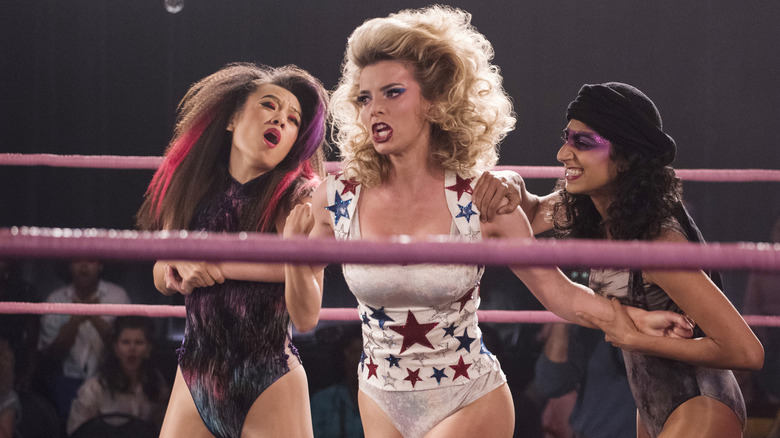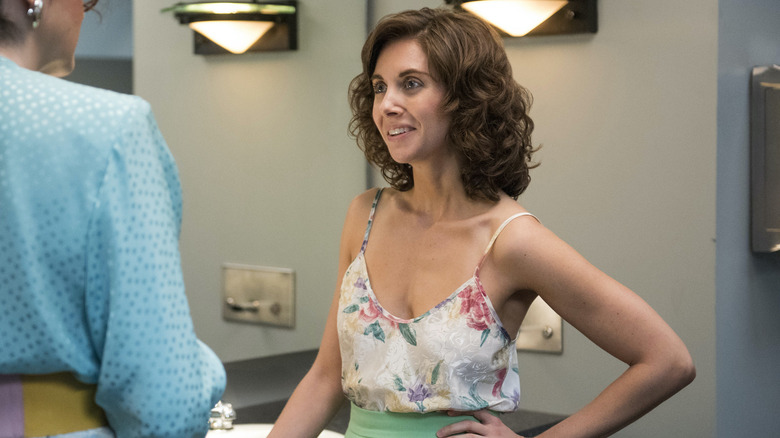Why Netflix Canceled GLOW After Three Seasons
When Hulk Hogan pinned the Iron Sheik at Madison Square Garden on January 23, 1984, to become the Worldwide Wrestling Federation's new heavyweight champion, professional wrestling was transformed practically overnight into a pop cultural phenomenon. This roughly coincided with Captain Lou Albano appearing in Cyndi Lauper's music video for "Girls Just Want to Have Fun," which laid the groundwork for the popular singer to participate in a crossover narrative that caught the attention of millions of non-wrestling fans. Though killjoy snobs lamented this explosion of interest in what had long been considered a tawdry, low-aiming entertainment, the never ending soap opera of the WWF and competitors like the Ted Turner-backed NWA and the AWA proved irresistible to many.
When it became clear that the pro wrestling trend wasn't a passing fad, enterprising promoters sought to capitalize on its popularity by launching their own leagues. The most inventive of these new organizations was easily the Gorgeous Ladies of Wrestling. Founded by David McLane in 1986, the league appealed to pro wrestling's underserved female fandom. Its roster of combatants was largely filled out with struggling actors, most of whom had to go through a wrestling crash course to learn the basics of the craft. Ultimately, GLOW leaned heavily into the theatricality of pro wrestling with its wonderfully emotive cast of baby faces and heels. It was the scrappy underdog that you were desperate to see succeed.
The story of GLOW's formation and turbulent rise was so fascinating in and of itself that "Nurse Jackie" writers Liz Flahive and Carly Mensch were inspired to create the nostalgia-drenched, heavily fictionalized "GLOW" for Netflix. Backed by "Orange is the New Black" creator Jenji Kohan, the series was an immediate hit with critics, who praised its deft exploration of female friendship and the stellar performances given by Betty Gilpin, Alison Brie, Marc Maron, and Chris Lowell. "GLOW" also managed to work in a heartbreaking storyline about the emotional toll the spread of AIDS was taking on the queer community, a topic that too many shows set in the 1980s avoid altogether to this day.
With a devoted fan following and a total of 18 Primetime Emmy nominations over its first three seasons, "GLOW" appeared to be in great shape as it headed into season 4. Alas, after three weeks of shooting, Netflix abruptly pulled the plug on the show. How could it do this to one of its most celebrated series? Its hand was forced by an act of god.
The Covid-19 pandemic led directly to GLOW's cancelation
"GLOW" was one of many productions that ground to a halt in March 2020 when the Covid-19 pandemic began to tear through the United States. You might recall that many movies and shows simply paused for months before studios, networks, and streamers could figure out how to run relatively safe sets, in which case it doesn't seem to make sense that "GLOW" would be canceled altogether.
At the time, Flahive and Mensch released a joint statement acknowledging that Covid-19 was "a national tragedy and should be our focus." They then went on to say:
"We were handed the creative freedom to make a complicated comedy about women and tell their stories. And wrestle. And now that's gone. There's a lot of s****y things happening in the world that are much bigger than this right now. But it still sucks that we don't get to see these 15 women in a frame together again."
Two years after the death of "GLOW," Brie shared her deep disappointment with Decider. "It's the great heartbreak of my career," she admitted. "But it will forever live on as, like, this great thing. I loved working on it — maybe more than anything I've worked on! — and I miss it a lot. But I feel very grateful for the time I had on the show."
There was hope in 2020 that "GLOW" might at least get a movie finale to tie up as many of the show's loose ends as possible (à la David Milch's "Deadwood: The Movie"), but now that it's been six years since the last episode aired, it's fairly clear that the series is gone for good. Had "GLOW" been further into its season 4 shoot than three weeks, there's a chance that Netflix would've been pot committed to completing the series once folks started going back to work. Unfortunately, it was good business for the streamer to axe it. As such, it's easily one of the most infuriatingly unfinished shows in recent television history. "Glow" absolutely deserved better.

